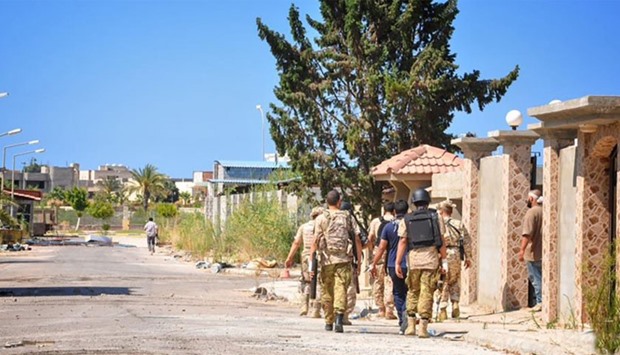US President Barack Obama defended the two-day-old air campaign, saying defeating the jihadists there was in America's national interest.
The IS bastion, located just across the Mediterranean from Europe, has been shaken by weeks of fierce clashes between jihadists and fighters allied to Libya's UN-backed Government of National Accord (GNA).
The city, 450 kilometres (280 miles) east of Tripoli, has been controlled by IS since June 2015, and its loss would be a major blow to the jihadists, who have faced a series of setbacks in Syria and Iraq.
Forces loyal to the Tripoli-based GNA said Tuesday they had gained full control of Al-Dollar, a central residential district in Sirte, after clashes that killed five of their members and wounded 17.
The announcement came after US aircraft launched five air strikes on Monday against "several targets in Sirte, hitting IS members and vehicles", the GNA forces said in a statement.
The Pentagon said the raids came in response to a request from Fayez al-Sarraj, the unity government chief.
"It is in America's national security interest in our fight against ISIL to make sure (the GNA are) able to finish the job," Obama told a White House news conference, using an IS acronym.
New air raids
"We're working in partnership with them to assure that IS does not get a stronghold in Libya, even as Libya begins what is going to be a long process to establish a functioning government and security system."
The US military on Tuesday launched a new round of air strikes, a defence official said, adding the United States had now carried out "about seven strikes" in Sirte.
While the Pentagon had conducted two previous air attacks on high-value IS targets in Libya since last year, Monday's action marked the first US strikes in Sirte itself.
The GNA press office said Tuesday that the new strikes had destroyed an IS rocket launcher and a vehicle.
IS has taken advantage of the chaos in Libya after the 2011 ouster of longtime dictator Moamer Kadhafi to increase its presence in the oil-rich country.
The jihadists have claimed deadly attacks, including beheadings, and targeted foreign embassies.
Sarraj's unity government emerged as the result of a UN-brokered power-sharing deal in December, but it has struggled to assert its authority across Libya.
A rival administration based in the country's far east has refused to cede power to Sarraj's government since he sailed into the capital under naval escort in March.
On Monday, Sarraj visited pro-government forces in Misrata, 190 kilometres to the northwest of Sirte, his office said.
'Limited' strikes
More than 300 pro-GNA fighters have been killed and over 1,500 wounded since the start of the battle for Sirte, according to medical sources in Misrata.
Forces supporting Sarraj's government entered Sirte on June 9, but their advance has been slowed by an IS fightback using suicide car bombs and sniper fire.
The pro-GNA forces are mostly made up of militias from western Libya established during the 2011 revolt.
Pentagon press secretary Peter Cook said on Monday that US strikes in Sirte would continue, without elaborating.
Sarraj said the American involvement would be "limited in time and will not go beyond Sirte and its suburbs".
The foreign ministry in Russia, which is carrying out anti-IS strikes in Syria at the request of the Damascus regime, stressed the need for "close coordination (in) the efforts of all countries engaged in the battle against terrorism".
The American raids were carried out at the request of Libyan authorities, it noted.
France, meanwhile, reaffirmed its "full support" for Libya's unity government, seeking to mend fences over the presence of French troops in the east of the conflict-ridden country.
Prime Minister Jean-Marc Ayrault, speaking to Sarraj by telephone on Friday, also "hailed the decision of the Libyan authorities to appeal for international aid", according to the foreign ministry in Paris.
Paris recognises the GNA, but it also supports anti-IS forces that are loyal to the parliament and government based in the east that are refusing to cede power to the UN-backed administration.

